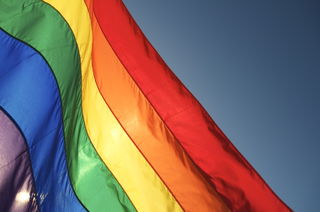Embarrassment
Coming to Terms with Coming Out
Can self-compassion relieve internalized homophobia and shame?
Posted June 2, 2019 Reviewed by Abigail Fagan
by Melissa Ellsworth, MS, guest contributor, with Matthew Skinta, PhD, ABPP

Coming Out Can be Hard
I never thought I’d have trouble coming out. I grew up in a relatively progressive American city, and in a time after many states had already legalized marriage equality — the right to marry regardless of sexual orientation. But sure enough, when I began my first relationship with another woman at the age of 26, I was feeling a lot of negative emotions I never thought I would experience. Coming out in a city smack in the middle of the Bible Belt and growing up Catholic really did a number on my newly gay self-identity. Thoughts like “this is wrong” and “I’m a sinner” would literally come into my head when just kissing my new girlfriend.
Even though I hadn’t identified as religious in over five years, I read the Bible more times than I ever did growing up, looking for some kind of reassurance for my new identity and attractions. Just holding my girlfriend’s hand in public made me my stomach twist with anxiety, fearful that someone was looking at us or would say something. It didn’t even matter if someone had said anything or had looked, I would just imagine the horrible things they were thinking about us and the “wrong things” we were doing.
Despite the fact that I objectively and rationally knew all these feelings were completely inconsistent with how I felt about others who had same-sex relationships (I fully supported gay marriage and same-sex relationships in general) somehow, when it was me who was now experiencing these attractions, it was somehow not “right”. For a year, I felt this general sense of “wrongness” — an overwhelming sense of anxiety, shame, fear, and secrecy.
While our society has become much more accepting of the lesbian, gay, bisexual, trans, and queer (LGBTQ) communities in recent years, feelings of internalized shame, stigma, and fear are still alive and well. The accumulation of a range of experiences of bias or violence, fears of rejection, and shame that affect LGBTQ people is referred to as minority stress. The piece of minority stress that most interested me, though, was internalized homophobia, when an LGBTQ individual internalizes society’s negative attitudes, stereotypes, and prejudice toward their own identity (Szymanski, Kashubeck-West, & Meyer, 2008). A defining feature of internalized homophobia is the conflict between beginning to realize that one LGBTQ and believing that one should be heterosexual, usually because of societal stigma toward individuals with an LGBTQ identity. Research has shown that internalized homophobia can result in a number of negative outcomes, including increased shame, high risk sexual and drug use behaviors, depression, anxiety and even suicide. Moving past internalized homophobia is key in terms of developing a healthy sense of identity, however many individuals continue to experience internalized homophobia long after coming out (Millar, Wang, & Pachankis, 2016).
Internalized homophobia can be exacerbated by a number of factors. Certain religious beliefs are a major key player in the impact of internalized homophobia. Some religions promote messages that express bias and animus toward LGBTQ people and condemn us as a group. This was a major issue during my coming out process, given a lot of the messages that I learned from my particular Catholic upbringing and how same-sex relationships were a sin. One large study of over 20,000 participants found that religion was a protective factor for against suicidality for straight/cisgender youth, but a risk factor for LGBTQ teens.
However, religion is not the only factor that plays into these feelings and certainly not all religions condemn people for being LGBTQ. Societal beliefs and social support definitely play a role as well. Often times, people develop internalized homophobia due to negative messages they received from society as a whole about LGBTQ people, from public debates on sex education to reports of discrimination. Many individuals fear coming out due to rejection from their family members and friends based upon media reports of family rejection, and these unfortunate realities can further exacerbate the experience of internalized homophobia.

The Case for Self-Compassion
Society is becoming more accepting of LGBTQ people and rights within the community are expanding every day. Marriage equality, anti-discrimination policies, and anti-bullying campaigns are a few of the measures we have taken to normalize LGBTQ identities. Further societal policies and institutional changes will only increase acceptance of the LGBTQ community and can help reduce internalized homophobia and shame experienced within this population.
However, societal changes are also slow ones, and despite these growths, individuals can still experience this internalized stigma and shame. My research at the University of Louisville has been trying to understand resilience factors that can buffer against the deleterious effects of internalized homophobia and shame in LGBTQ individuals. One way is through increasing self-compassion. A relatively new construct arising in the mindfulness-based literature, self-compassion is derived from an overall concept of compassion, which is “being touched by the suffering of others, opening one’s awareness to others’ pain and not avoiding or disconnecting from it, so that feelings of kindness toward others and the desire to alleviate their suffering emerge” (Wispe, 1991). Self-compassion is the application of these principles directed towards oneself in a deliberate way. Overall, self-compassion provides an alternative way of relating to oneself with kindness, and has been demonstrated in intervention studies to be a powerful antidote to many poor mental health outcomes in individuals suffering with depression (Van Dam, Sheppard, Forsyth & Earleywine, 2011), feelings of high shame (Gilbert & Irons, 2005) and has been shown to increase overall positive psychological functioning (Neff, Rude & Kirkpatrick, 2007). One study found that gay men experienced more impactful shaming memories from parents, that were in turn correlated to symptoms of depression, but that self-compassion was a protective factor (Matos et al., 2017).
Using an empirically validated self-report measure of self-compassion, our research found that LGB individuals who reported higher scores in self-compassion reported lower rates of shame, internalized homophobia, and depression. This suggests the potential utility that increasing one’s self-compassion could have in reducing the experience of self-stigma such as internalized homophobia and shame, and ultimately reduce poor mental health outcomes in LGBTQ individuals. Research on how to incorporate self-compassion into mental health interventions has already shown positive results in clinical and non-clinical populations (Gilbert & Irons, 2005; Neff & Germer, 2013), and given our research findings, expanding this research into LGBTQ-sensitive interventions would seem to be a critical avenue to explore.
Overall, increasing positive self-worth and self-acceptance during the coming out process is crucial for individuals who face societal and social stigma related to their LGBTQ identity and can help buffer against internalized homophobia and shame. In addition to promoting internal resilience factors such as self-compassion, finding LGBTQ social support, including gay-affirming churches, local LGBTQ groups on school campuses or in the community, or LGBTQ-affirming psychotherapy can help to increase positive feelings about one’s identity. The coming out process can be a challenging one, but there’s a lot one can do to navigate the scary and negative feelings that can come with it. Our research will continue to explore the role that these individual and interpersonal resilience factors have in promoting positive mental and physical health in LGBTQ individuals. Affirming interventions that focus on internalized homophobia have been shown to reduce depression, anxiety, and risky sexual behaviors (Millar, Wang, & Pachankis, 2016). Those struggling are encouraged to seek help and support from an experienced LGBTQ-affirming psychotherapist.
Melissa Ellsworth, MS, is a doctoral student in Clinical Psychology and an intern at the Salt Lake City VA Healthcare System. Her research and clinical interests include the etiology, maintenance and treatment of chronic pain; women's sexuality and health; LGBTQ health disparities; and the role of mindfulness and self-compassion in clinical interventions.
References
Barnard, L. K., & Curry, J. F. (2011). Self-compassion: Conceptualizations, correlates, & interventions. Review of General Psychology, 15(4), 289.
Gilbert, P., & Irons, C. (2005). Focused therapies and compassionate mind training for shame and self-attacking. Compassion: Conceptualizations, Research and Use in Psychotherapy, 263-325.
Matos, M., Carvalho, S., A., Cunha, M., Galhardo, A. & Sepodes., C. (2017) Psychological Flexibility and Self-Compassion in Gay and Heterosexual Men: How They Relate to Childhood Memories, Shame, and Depressive Symptoms. Journal of LGBT Issues in Counseling, 11 (2), 88-105. doi: 10.1080/15538605.2017.1310007
Millar, B.. M., Wang, W. & Pachankis, J. E. (2016).The Moderating Role of Internalized Homonegativity on the Efficacy of LGB-Affirmative Psychotherapy: Results From a Randomized Controlled Trial With Young Adult Gay and Bisexual Men. Journal of Consulting and Clinical Psychology, 84 (7), 565–570.
Neff, K. (2003). Self-compassion: An alternative conceptualization of a healthy attitude toward oneself. Self and Identity, 2(2), 85-101.
Neff, K. D., Rude, S. S., & Kirkpatrick, K. L. (2007). An examination of self-compassion in relation to positive psychological functioning and personality traits. Journal of Research in Personality, 41(4), 908-916.
Szymanski, D. M., Kashubeck-West, S., & Meyer, J. (2008). Internalized heterosexism: Measurement, psychosocial correlates, and research directions. The Counseling Psychologist, 36(4), 525-574.
Van Dam, N. T., Sheppard, S. C., Forsyth, J. P., & Earleywine, M. (2011). Self-compassion is a better predictor than mindfulness of symptom severity and quality of life in mixed anxiety and depression. Journal of Anxiety Disorders, 25(1), 123-130.
Wispe, L. (1991). The psychology of sympathy. New York: Plenum.
Woods, H., & Proeve, M. (2014). Relationships of mindfulness, self-compassion, and meditation experience with shame-proneness. Journal of Cognitive Psychotherapy, 28(1), 20-33.




